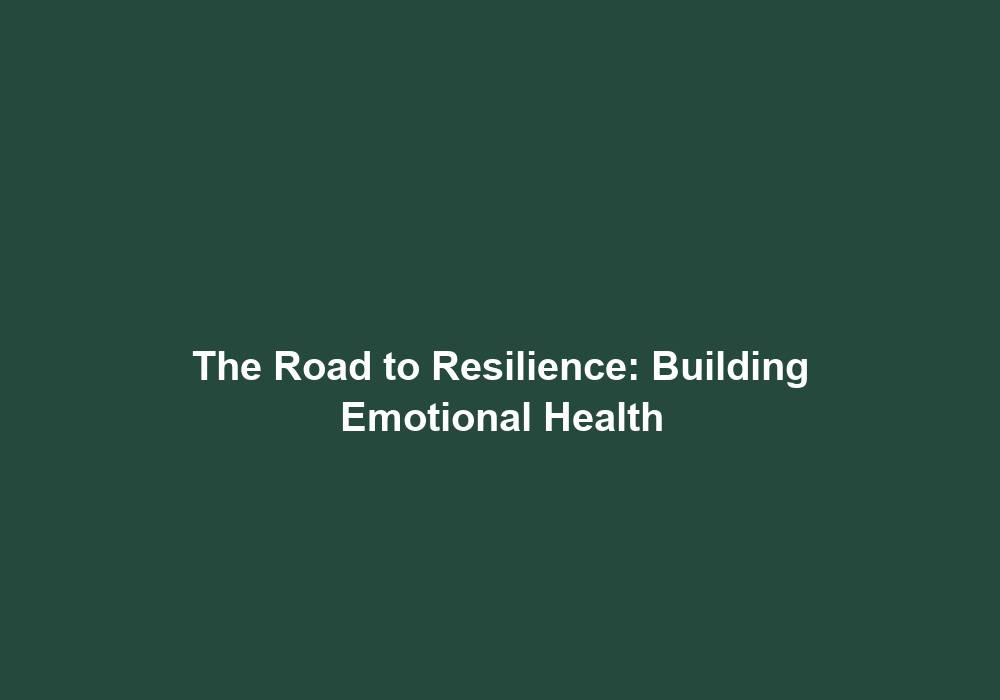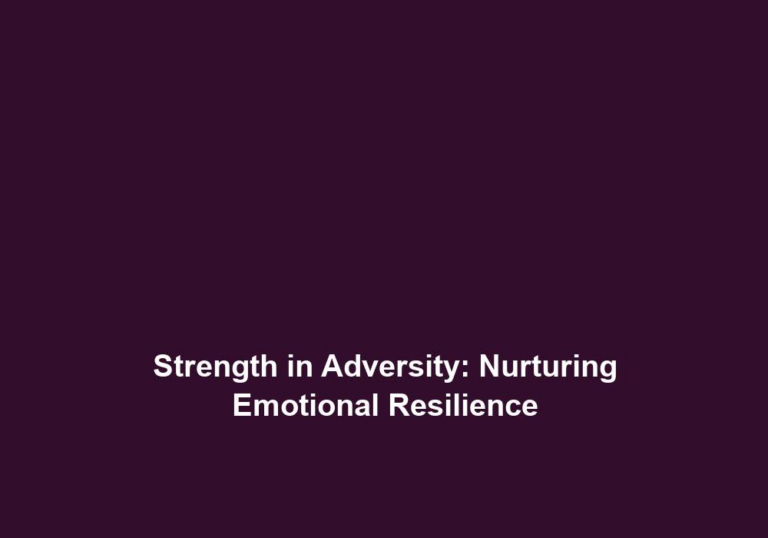The Road to Resilience: Building Emotional Health
Emotional health plays a crucial role in our overall well-being. It enables us to cope with life’s challenges, bounce back from adversity, and maintain a positive outlook. Building emotional resilience is a journey that requires effort, but the rewards are immeasurable. In this article, we will explore the various strategies and practices that can help us strengthen our emotional well-being and navigate through life’s ups and downs.
Understanding Emotional Resilience
Before delving into the strategies, it’s important to have a clear understanding of what emotional resilience entails. Emotional resilience refers to our ability to adapt and cope with stress, adversity, and trauma. It is not about avoiding difficult situations, but rather about bouncing back and growing stronger from them.
Building emotional resilience is a lifelong process that involves developing skills, attitudes, and support systems that enable us to face challenges head-on and thrive. By nurturing our emotional health, we create a solid foundation for a fulfilling and successful life.
Cultivate Self-Awareness
Self-awareness is the cornerstone of emotional resilience. It involves understanding our emotions, thoughts, and behaviors. By practicing mindfulness and reflection, we can become more aware of how we react to different situations and identify patterns that may hinder our emotional well-being. Self-awareness allows us to make conscious choices and respond to challenges in a more constructive manner.
To cultivate self-awareness, you can try journaling about your feelings and thoughts, taking time for self-reflection, and practicing mindfulness meditation. These practices help you develop a deeper understanding of yourself and your emotional responses, enabling you to navigate through difficult situations with greater ease.
Build Healthy Relationships
Strong and supportive relationships are essential for emotional resilience. Surrounding ourselves with people who uplift and inspire us can greatly enhance our ability to cope with stress. Cultivate relationships that are based on trust, respect, and open communication. Seek out social connections that provide emotional support, whether it be through family, friends, or support groups.
Building healthy relationships involves effective communication, active listening, and empathy. It’s important to express your needs and emotions to others and also be there for them when they need support. By fostering these connections, you create a network of support that can help you navigate through challenging times and build emotional resilience.
Develop Effective Coping Strategies
Everyone copes with stress differently, and it’s important to find strategies that work for you. Engage in activities that help you relax and recharge, such as exercise, meditation, or hobbies. Practice deep breathing techniques or journaling to express and process your emotions. Find healthy outlets for stress and experiment with different coping mechanisms until you find what resonates with you.
In addition to these individual coping strategies, it can also be helpful to seek professional help, such as therapy or counseling. A trained professional can provide guidance and support in developing effective coping strategies that are tailored to your specific needs and circumstances.
Nurture a Growth Mindset
A growth mindset is the belief that our abilities and intelligence can be developed through dedication and hard work. Embracing this mindset allows us to view challenges as opportunities for growth and learning. By reframing setbacks as temporary and surmountable, we can cultivate resilience and bounce back stronger than ever.
To nurture a growth mindset, it’s important to embrace a positive attitude towards challenges and failures. Instead of seeing them as roadblocks, view them as stepping stones towards personal growth and development. Cultivate a mindset that embraces learning, perseverance, and the belief that you can overcome any obstacle that comes your way.
Practice Self-Care
Taking care of ourselves is crucial for emotional resilience. Make self-care a priority by ensuring you get enough sleep, eat nutritious meals, and engage in regular physical activity. Set aside time for activities that bring you joy and relaxation, such as reading, taking walks in nature, or enjoying a hobby. By nourishing our bodies and minds, we build a strong foundation for emotional well-being.
In addition to these basic self-care practices, it’s important to also set boundaries and prioritize your own needs. Learn to say no when necessary and make time for activities that recharge and rejuvenate you. By practicing self-care, you replenish your emotional reserves and strengthen your resilience to face life’s challenges.
Seek Professional Help if Needed
If you find that your emotional well-being is significantly impacted, don’t hesitate to seek professional help. Therapists and counselors can provide valuable support and guidance in building emotional resilience. They can help you develop specific strategies to address your unique challenges and navigate through difficult times.
Professional help can be particularly beneficial if you are experiencing persistent feelings of sadness, anxiety, or overwhelm. A mental health professional can help you explore the underlying causes of these emotions and provide you with the tools and support you need to build emotional resilience.
The Importance of Emotional Resilience in Daily Life
Emotional resilience has numerous benefits that impact our daily lives. It enables us to adapt to change, maintain positive relationships, and achieve our goals. Here are some key reasons why emotional resilience is important:
-
Better Mental Health: Resilience is strongly linked to improved mental health. It helps protect against conditions such as anxiety and depression, and allows us to effectively manage stress.
-
Enhanced Problem-Solving Abilities: When faced with challenges, emotionally resilient individuals are better equipped to problem-solve and find solutions. They can think clearly and make sound decisions even in high-pressure situations.
-
Increased Productivity and Success: Emotional resilience fosters a positive mindset and the ability to bounce back from failures. This resilience leads to increased motivation, productivity, and ultimately, success in various aspects of life.
-
Improved Relationships: Resilience allows us to navigate conflicts and maintain healthy relationships. By effectively managing our emotions, we can communicate better, empathize with others, and build stronger connections.
-
Greater Happiness and Life Satisfaction: Emotional resilience enables us to find joy and fulfillment in life, even during challenging times. It equips us with the tools to cultivate a positive outlook and enjoy a higher overall quality of life.
Conclusion
Building emotional resilience is a transformative journey that requires self-reflection, effort, and perseverance. By nurturing our emotional well-being and implementing strategies such as self-awareness, healthy relationships, coping skills, and self-care, we can navigate through life’s challenges and emerge stronger than ever. Remember, resilience is not about avoiding difficulties but rather about facing them head-on and using them as stepping stones towards personal growth and happiness. Start your journey towards emotional resilience today and pave the way for a fulfilling and resilient future.







